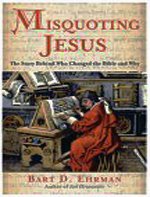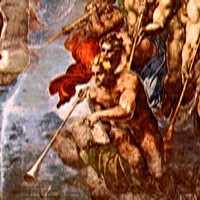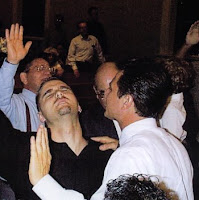"Therefore let all the house of Israel know assuredly that God has made this Jesus, whom you crucified, both Lord and Christ.’ 37 Now when they heard this, they were cut to the heart, and said to Peter and the rest of the apostles, ‘Men and brethren, what shall we do?’ 38 Then Peter said to them, ‘Repent, and let every one of you be baptized in the name of Jesus Christ for the remission of sins; and you shall receive the gift of the Holy Spirit. 39 For the promise is to you and to your children, and to all who are afar off, as many as the Lord our God will call.” “40 And with many other words he testified and exhorted them, saying, ‘Be saved from this perverse generation.’ 41 Then those who gladly received his word were baptized; and that day about three thousand souls were added to them. 42 And they continued steadfastly in the apostles’ doctrine and fellowship, in the breaking of bread, and in prayers. 43 Then fear came upon every soul, and many wonders and signs were done through the apostles. 44 Now all who believed were together, and had all things in common, 45 and sold their possessions and goods, and divided them among all, as anyone had need. 46 So continuing daily with one accord in the temple, and breaking bread from house to house, they ate their food with gladness and simplicity of heart, 47 praising God and having favor with all the people. And the Lord added to the church daily those who were being saved.” (Acts 2:36–47 NKJV
In the city of Samaria (Acts 8:4–13) men and women heard the preaching of Phillip and were baptized. Of all the things our preaching should do, it should compel the lost to be baptized in Jesus name. Simon the sorcerer (who was also baptized), after seeing the miracles and signs, that accompanied the preaching and baptism attempted to purchase the ability to imitate these events.
4 Therefore those who were scattered went everywhere preaching the word. 5 Then Philip went down to the city of Samaria and preached Christ to them. 6 And the multitudes with one accord heeded the things spoken by Philip, hearing and seeing the miracles which he did. 7 For unclean spirits, crying with a loud voice, came out of many who were possessed; and many who were paralyzed and lame were healed. 8 And there was great joy in that city.” “9 But there was a certain man called Simon, who previously practiced sorcery in the city and astonished the people of Samaria, claiming that he was someone great, 10 to whom they all gave heed, from the least to the greatest, saying, ‘This man is the great power of God.’ 11 And they heeded him because he had astonished them with his sorceries for a long time.” 12 But when they believed Philip as he preached the things concerning the kingdom of God and the name of Jesus Christ, both men and women were baptized. 3 Then Simon himself also believed; and when he was baptized he continued with Philip, and was amazed, seeing the miracles and signs which were done.” (Acts 8:4–13 NKJV)
In Acts 8:26–39 an Ethiopian eunuch asks for baptism after hearing the Word of the Lord explained and the saving message of Jesus Christ (vs.35) by Philip. The scriptures do not say that Philip quoted Acts 2:38 or included water baptism; however, this is obviously what he preached because upon seeing water the Eunuch said, “‘See, here is water. What hinders me from being baptized?” Evidently, the message of Jesus included baptism and the Eunuch felt the compulsion to comply with this message.
26 Now an angel of the Lord spoke to Philip, saying, ‘Arise and go toward the south along the road which goes down from Jerusalem to Gaza.’ This is desert. 27 So he arose and went. And behold, a man of Ethiopia, a eunuch of great authority under Candace the queen of the Ethiopians, who had charge of all her treasury, and had come to Jerusalem to worship, 28 was returning. And sitting in his chariot, he was reading Isaiah the prophet. 29 Then the Spirit said to Philip, ‘Go near and overtake this chariot.’ 30 So Philip ran to him, and heard him reading the prophet Isaiah, and said, ‘Do you understand what you are reading?’ 31 And he said, ‘How can I, unless someone guides me?’ And he asked Philip to come up and sit with him. 32 The place in the Scripture which he read was this: ‘He was led as a sheep to the slaughter; And as a lamb before its shearer is silent, So He opened not His mouth. 33 In His humiliation His justice was taken away, And who will declare His generation? For His life is taken from the earth.’ 34 So the eunuch answered Philip and said, ‘I ask you, of whom does the prophet say this, of himself or of some other man?’ 35 Then Philip opened his mouth, and beginning at this Scripture, preached Jesus to him. 36 Now as they went down the road, they came to some water. And the eunuch said, ‘See, here is water. what hinders me from being baptized?’ 37 Then Philip said, ‘If you believe with all your heart, you may.’ And he answered and said, ‘I believe that Jesus Christ is the Son of God.’ 38 So he commanded the chariot to stand still. And both Philip and the eunuch went down into the water, and he baptized him. 39 Now when they came up out of the water, the Spirit of the Lord caught Philip away, so that the eunuch saw him no more; and he went on his way rejoicing.” (Acts 8:26–39)
Paul in Acts was blinded by light as Jesus appeared to him on the road to Damascus. After his sight was restored Ananias presses Paul to be baptized by asking, “why are you waiting? Arise and be baptized.” (vs. 16) Obviously baptism was an important part in coming to Christ
Now it happened, as I journeyed and came near Damascus, suddenly a great light from heaven shone around me. 7 And I fell to the ground and heard a voice saying to me, “Saul, Saul, why are you persecuting Me?” 8 So I answered, “Who are You, Lord?’ And He said to me, “I am Jesus of Nazareth, whom you are persecuting.” 9 “And those who were with me indeed saw the light and were afraid, but they did not hear the voice of Him who spoke to me. 10 So I said, “What shall I do, Lord?” And the Lord said to me, “Arise and go into Damascus and there you will be told all things which are appointed for you to do.” 11 And since I could not see for the glory of that light, being led by the hand of those who were with me, I came into Damascus. 12 Then a certain Ananias, a devout man according to the law, having a good testimony with all the Jews who dwelt there, 13 came to me; and he stood and said to me, “Brother Saul, receive your sight.” And at that same hour I looked up at him. 14 Then he said, “The God of our fathers has chosen you that you should know His will, and see the Just One, and hear the voice of His mouth. 15 For you will be His witness to all men of what you have seen and heard. 16 And now why are you waiting? Arise and be baptized, and wash away your sins, calling on the name of the Lord.”’”
Cornelius in Acts 10:1–48 and his whole household were baptized. This is a very powerful conversion of the early church; it includes a first hand occurrence of Gentile salvation. Similarly this account also demonstrates a command or haste to be baptized, there is no delay.
34 Then Peter opened his mouth and said: ‘In truth I perceive that God shows no partiality. 35 But in every nation whoever fears Him and works righteousness is accepted by Him. 36 The word which God sent to the children of Israel, preaching peace through Jesus Christ—He is Lord of all—37 that word you know, which was proclaimed throughout all Judea, and began from Galilee after the baptism which John preached: 38 how God anointed Jesus of Nazareth with the Holy Spirit and with power, who went about doing good and healing all who were oppressed by the devil, for God was with Him. 39 And we are witnesses of all things which He did both in the land of the Jews and in Jerusalem, whom they killed by hanging on a tree. 40 Him God raised up on the third day, and showed Him openly, 41 not to all the people, but to witnesses chosen before by God, even to us who ate and drank with Him after He arose from the dead. 42 And He commanded us to preach to the people, and to testify that it is He who was ordained by God to be Judge of the living and the dead. 43 To Him all the prophets witness that, through His name, whoever believes in Him will receive remission of sins.’ The Holy Spirit Falls on the Gentiles 44 While Peter was still speaking these words, the Holy Spirit fell upon all those who heard the word. 45 And those of the circumcision who believed were astonished, as many as came with Peter, because the gift of the Holy Spirit had been poured out on the Gentiles also. 46 For they heard them speak with tongues and magnify God. Then Peter answered, 47 ‘Can anyone forbid water, that these should not be baptized who have received the Holy Spirit just as we have?’ 48 And he commanded them to be baptized in the name of the Lord. Then they asked him to stay a few days.” (Acts 10:34–48 NKJV)
In Acts 16:13–15 Lydia and her whole household were baptized. The scriptures say that “The Lord opened her heart to heed the things spoken by Paul.” The very next verse says, “And when she and her household were baptized…” Obviously something in the illumination by the Lord and the preaching of Paul compelled her to be baptized. Could it be he preached Acts 2:38
“And on the Sabbath day we went out of the city to the riverside, where prayer was customarily made; and we sat down and spoke to the women who met there. 14 Now a certain woman named Lydia heard us. She was a seller of purple from the city of Thyatira, who worshipped God. The Lord opened her heart to heed the things spoken by Paul. 15 And when she and her household were baptized, she begged us, saying, ‘If you have judged me to be faithful to the Lord, come to my house and stay.’ So she persuaded us.” (Acts 16:13–15 NKJV)
In Acts 16:23-34 the Philippian jailer and his whole household were baptized. After God had supernaturally released Paul and Silas the Roman jailer runs to them and asks “what must I do to be saved?” They begin by saying that you must believe on the Lord Jesus Christ. This is quite a step for a polytheistic Roman. Subsequently, “the same hour of the night”, the Roman jailer and his household were baptized.
23) And when they had laid many stripes on them, they threw them into prison, commanding the jailer to keep them securely. 24 Having received such a charge, he put them into the inner prison and fastened their feet in the stocks. 25 But at midnight Paul and Silas were praying and singing hymns to God, and the prisoners were listening to them. 26 Suddenly there was a great earthquake, so that the foundations of the prison were shaken; and immediately all the doors were opened and everyone’s chains were loosed. 27 And the keeper of the prison, awaking from sleep and seeing the prison doors open, supposing the prisoners had fled, drew his sword and was about to kill himself. 28 But Paul called with a loud voice, saying, ‘Do yourself no harm, for we are all here.’ 29 Then he called for a light, ran in, and fell down trembling before Paul and Silas. 30 And he brought them out and said, ‘Sirs, what must I do to be saved?’ 31 So they said, ‘Believe on the Lord Jesus Christ, and you will be saved, you and your household.’ 32 Then they spoke the word of the Lord to him and to all who were in his house. 33 And he took them the same hour of the night and washed their stripes. And immediately he and all his family were baptized. 34 Now when he had brought them into his house, he set food before them; and he rejoiced, having believed in God with all his household.”Acts 16:23–34 NKJV
Crispus, his household and many Corinthians in Acts 18:5-8 were baptized. This was a massive baptism. After the intense preaching of Paul things were obviously changed in the environment. So much that “many of the Corinithans”, who had previously resisted Paul, “were baptized.”
“5 When Silas and Timothy had come from Macedonia, Paul was compelled by the Spirit, and testified to the Jews that Jesus is the Christ. 6 But when they opposed him and blasphemed, he shook his garments and said to them, ‘Your blood be upon your own heads; I am clean. From now on I will go to the Gentiles.’ 7 And he departed from there and entered the house of a certain man named Justus, one who worshiped God, whose house was next door to the synagogue. 8 Then Crispus, the ruler of the synagogue, believed on the Lord with all his household. And many of the Corinthians, hearing, believed and were baptized.” (Acts 18:5–8 NKJV)
Given these examples, it should be very clear to believers that baptism plays a very big part in our spiritual life. The previous examples show us that baptism, in whatever part it plays, is vitally connected to one’s salvation.











